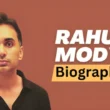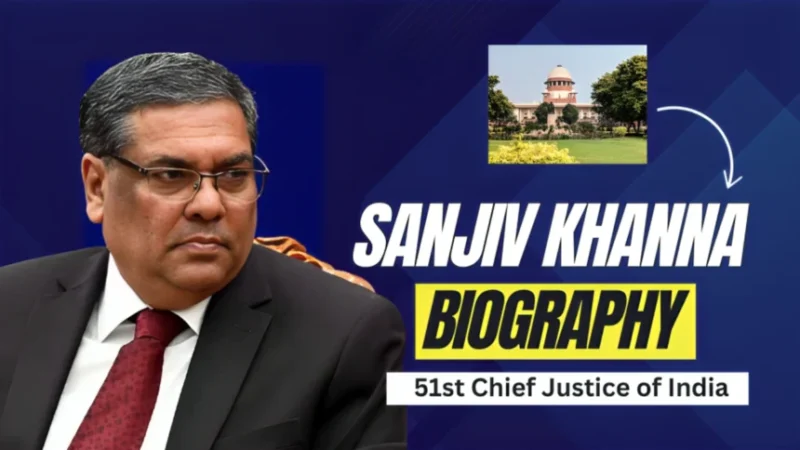Justice Sanjiv Khanna is one of the most respected and distinguished figures in India’s judiciary, known for his dedication to justice and integrity. His illustrious career, from district courts to the Supreme Court, is a testament to his hard work, legal acumen, and commitment to upholding the rule of law. Born into a family deeply rooted in the legal profession, Justice Khanna has carved out his unique legacy and continues to influence India’s legal landscape. This article explores his background, family, education, career, landmark judgments, and the significant role he is set to play as the 51st Chief Justice of India.
Family Background: A Legacy of Law
Justice Sanjiv Khanna was born on May 14, 1960, into a family that has a rich history in the Indian legal system. His father, Justice Dev Raj Khanna, was a judge at the Delhi High Court, where he served with distinction until his retirement in 1985. Justice Dev Raj Khanna’s career in the judiciary set the foundation for Sanjiv Khanna’s own legal journey, instilling in him the values of fairness and justice from a young age.
Justice Khanna’s mother, Saroj Khanna, was an educator and a lecturer at Lady Shri Ram College in Delhi, where she taught Hindi. Her influence on Sanjiv’s upbringing was significant, as she fostered a love for learning, discipline, and integrity, traits that would define his future career.
In addition to his father’s influence, Justice Sanjiv Khanna is also the nephew of the renowned Supreme Court judge, Justice Hans Raj Khanna. His uncle, Justice Hans Raj Khanna, is celebrated for his courageous stance during India’s Emergency (1975–1977), where he famously defended individual rights and freedoms in the face of immense political pressure. His dissent in the ADM Jabalpur v. Shivkant Shukla case, which upheld the suspension of habeas corpus during the Emergency, became a defining moment in Indian judicial history. This legacy of courage and integrity in the face of adversity undoubtedly shaped Sanjiv Khanna’s own approach to the law.
Education: The Early Foundations
Justice Sanjiv Khanna received his early education from Modern School, one of Delhi’s most prestigious institutions, graduating in 1977. His time at Modern School was marked by academic excellence and participation in various extracurricular activities that helped shape his leadership skills and critical thinking abilities.
After completing his schooling, he enrolled at St. Stephen’s College, Delhi, one of India’s premier institutions of higher learning. Graduating in 1980, his time at St. Stephen’s not only provided him with a rigorous academic foundation but also helped him develop a nuanced understanding of social issues, justice, and ethics. The liberal environment of St. Stephen’s played a critical role in molding his intellectual outlook.
Following his graduation, Khanna pursued his passion for law and enrolled at the Campus Law Centre at the University of Delhi. The Campus Law Centre is one of India’s top law schools, known for producing many of the country’s finest legal minds. During his time there, Justice Khanna honed his legal skills and built a deep understanding of constitutional law, public interest litigation, and commercial law. This rigorous legal training laid the groundwork for his distinguished career.
Starting a Legal Career: Climbing the Judicial Ladder
Justice Sanjiv Khanna officially began his legal career in 1983, registering as an advocate with the Bar Council of Delhi. Like many young lawyers, he started by practicing in the district courts, where he gained valuable hands-on experience with the practicalities of law. Over time, his expertise and reputation grew, particularly in the fields of constitutional law, taxation, arbitration, and commercial law.
Key Roles in Legal Practice
One of the pivotal moments in his early career was his appointment as Senior Standing Counsel for the Income Tax Department. This role put him in charge of significant tax litigation cases and helped him build a strong reputation for fairness and thoroughness. Justice Khanna’s understanding of complex tax laws and his ability to navigate the intricacies of the legal system quickly earned him the respect of his peers.
In addition to his work with the Income Tax Department, Justice Khanna served as Standing Counsel for the National Capital Territory (NCT) of Delhi. His tenure in this position allowed him to work on high-profile cases that shaped the governance of the national capital. His handling of these cases demonstrated his ability to balance government interests with the rights of citizens, a hallmark of his later career as a judge.
Entry into the Judiciary
In 2005, after more than two decades of legal practice, Sanjiv Khanna was appointed as an Additional Judge of the Delhi High Court. This marked a significant step in his career, as he transitioned from practicing law to interpreting it from the bench. His consistent delivery of fair and well-reasoned judgments soon earned him a permanent position as a judge in 2006.
Justice Khanna’s time at the Delhi High Court was marked by several important judgments, many of which dealt with constitutional issues, tax disputes, and public interest litigation. His judicial philosophy, which emphasized the protection of individual rights and the fair application of the law, became evident during this period.
Elevation to the Supreme Court: A Controversial Promotion
In 2019, Justice Sanjiv Khanna was elevated to the Supreme Court of India, the highest judicial authority in the country. His appointment was not without controversy, as he was promoted over several senior judges, leading to discussions about judicial seniority and merit-based appointments. However, Justice Khanna’s impeccable track record, integrity, and legal acumen soon put to rest any doubts about his suitability for the position.
At the Supreme Court, Justice Khanna quickly became known for his thoughtful and balanced judgments, which contributed to shaping India’s legal landscape on critical constitutional and social issues. His decisions have often reflected his deep commitment to safeguarding individual rights, transparency, and the principles of justice.
Landmark Judgments: Shaping India’s Legal Landscape
Justice Sanjiv Khanna has been a part of numerous landmark rulings during his tenure at the Supreme Court. His judgments have had far-reaching implications for Indian society, governance, and constitutional law.
1. Abrogation of Article 370
One of the most significant cases in recent Indian history was the abrogation of Article 370, which granted special status to Jammu and Kashmir. Justice Khanna played a crucial role in the Supreme Court bench that upheld the government’s decision to revoke this special status. The abrogation of Article 370 marked a turning point in the relationship between the central government and the former state of Jammu and Kashmir, and Justice Khanna’s ruling contributed to the legal foundation of this historic decision.
2. Electoral Bond Scheme
Justice Khanna was also instrumental in the Supreme Court’s decision to scrap the Electoral Bond Scheme, which aimed to make political funding more transparent. His judgment in this case emphasized the need for transparency in electoral financing to ensure the integrity of democratic processes. This ruling was seen as a significant step towards reducing the influence of unaccounted money in Indian elections.
3. VVPAT Verification
In a crucial case concerning electoral integrity, Justice Khanna’s Division Bench rejected three petitions from the Association for Democratic Reforms (ADR) that sought a return to paper ballots, voter self-verification of VVPAT slips, and 100% VVPAT slip counting. His judgment upheld the current system of random VVPAT verification, arguing that it sufficiently ensures the integrity of India’s electoral system. This decision reaffirmed the balance between the use of modern technology in elections and the need for robust safeguards to protect the accuracy of election results.
4. Supreme Court’s Power to Grant Divorces
Justice Khanna was part of the bench that expanded the Supreme Court’s powers in granting divorces under Article 142 of the Constitution. This judgment allowed the Supreme Court to dissolve marriages on the grounds of “irretrievable breakdown” without requiring the consent of both parties, thereby providing relief to individuals trapped in difficult marriages. This ruling had significant implications for family law in India and was hailed as a progressive step toward empowering individuals in unhappy marriages.
Set to Become Chief Justice of India
One of the most significant milestones in Justice Khanna’s career is his forthcoming appointment as the Chief Justice of India (CJI). He is set to take over from Justice DY Chandrachud on November 11, 2024, becoming the 51st Chief Justice of India.
As CJI, Justice Khanna will lead the Indian judiciary during a critical time, overseeing important cases that could shape the future of India’s legal and political landscape. His elevation to this position is a recognition of his contributions to Indian jurisprudence and his unwavering commitment to justice.
Retirement Date and Tenure as Chief Justice
Justice Sanjiv Khanna’s tenure as Chief Justice of India will be relatively short, as he is scheduled to retire on May 13, 2025, just one day before his 65th birthday. Despite the brief duration of his tenure, Justice Khanna is expected to make significant contributions during his time as CJI. His experience, legal insight, and leadership abilities will be critical in guiding the Supreme Court during this period.
Personal Life: A Private and Humble Persona
Despite his high-profile career, Justice Khanna has maintained a relatively low-key personal life. He is married, but there is little public information available about his wife and family. His decision to keep his private life out of the spotlight is a reflection of his humility and desire to focus on his work rather than personal publicity. This discretion has earned him respect not only within the legal fraternity but also among the public.
Conclusion: A Legacy of Justice and Integrity
Justice Sanjiv Khanna’s journey from a family with deep legal roots to becoming one of India’s most influential judges is a story of dedication, intellect, and integrity. His landmark judgments on issues such as Article 370, electoral transparency, and family law have left a lasting impact on India’s legal system. As he prepares to take on the role of Chief Justice of India, his legacy will be defined by his commitment to upholding the principles of justice and protecting individual rights.
With his upcoming tenure as CJI and his imminent retirement, Justice Khanna’s contributions to the judiciary will continue to shape the legal landscape of India for years to come. His rise to the top of the judiciary is an inspiring example of how hard work, integrity, and a deep sense of duty can lead to a career of immense national significance.
Disclaimer
This article is based on publicly available information and sources believed to be reliable. While every effort has been made to ensure the accuracy of the information provided, details may change over time, and new developments regarding Justice Sanjiv Khanna’s career may emerge. This content is for informational purposes only and should not be considered as official or legal advice. Readers are encouraged to verify information independently before making any conclusions. India At Present Info and the author are not responsible for any inaccuracies or omissions in the information provided.








